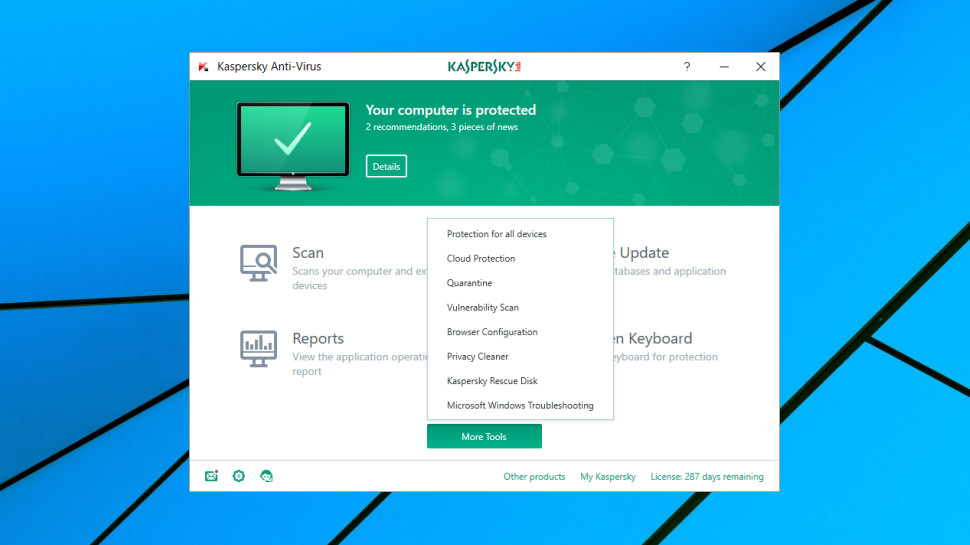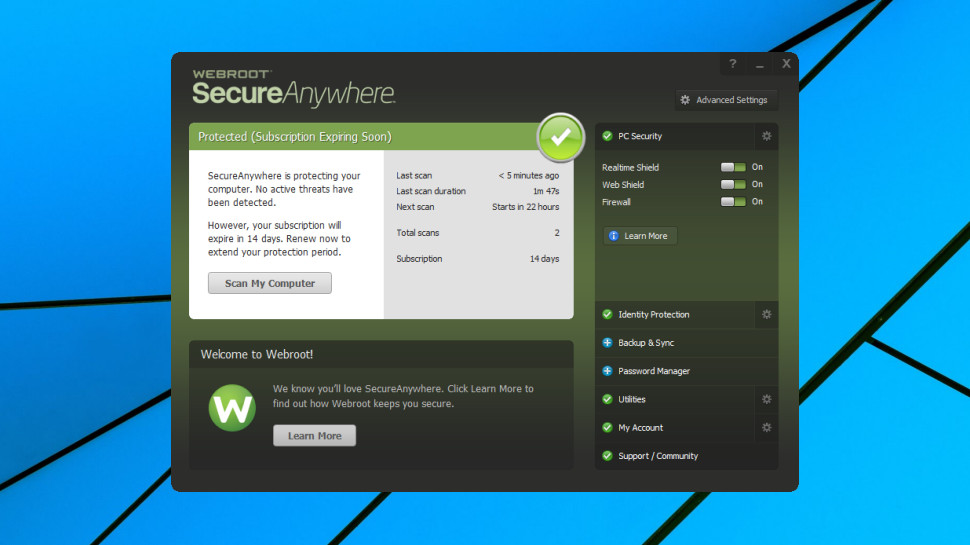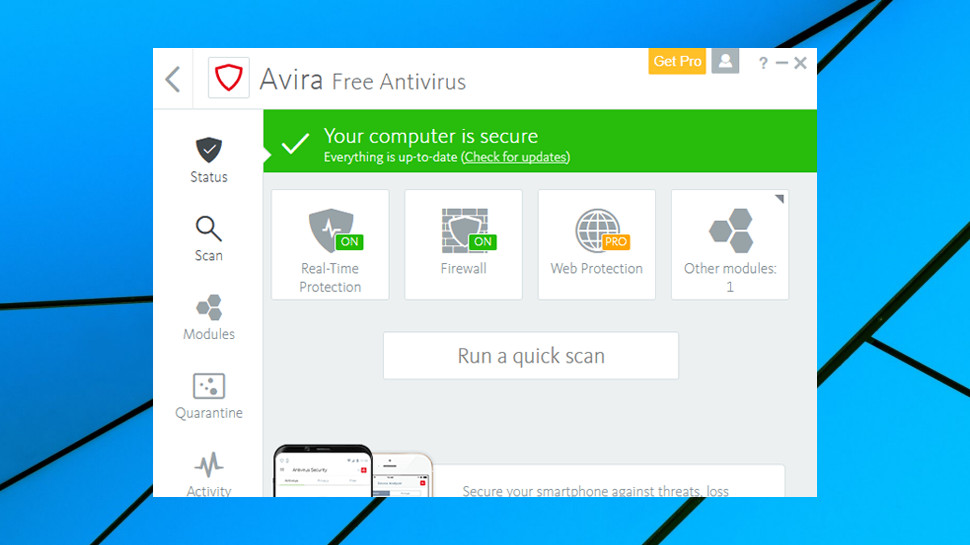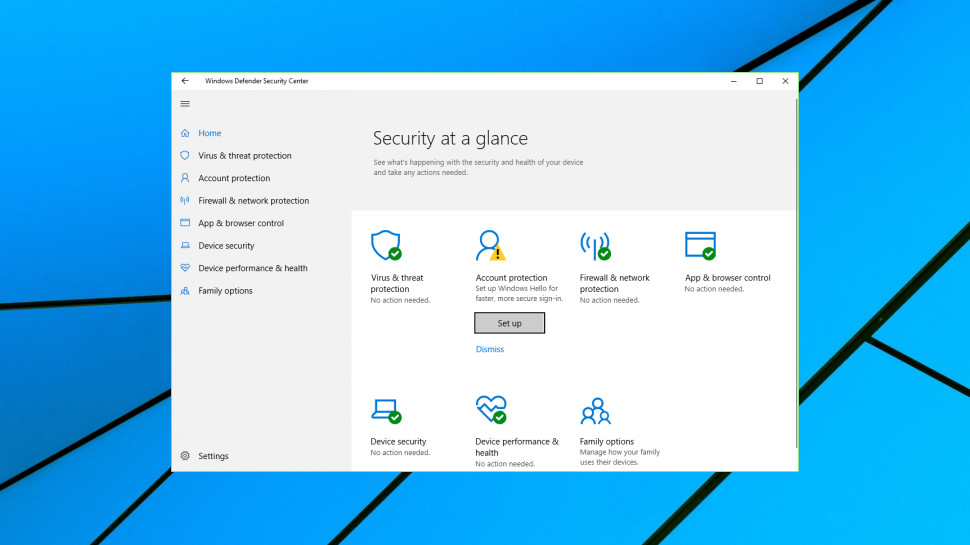The best antivirus software in 2018
With cyberattacks on the rise and growing ever more sophisticated, it's vital to ensure your devices are protected from the latest online threats. That's why we've put together this list of the best antivirus software for both PC and Mac.
Staying safe and secure online is especially important for freelance and employed professionals: the consequences of an attack could be disastrous. Could you cope if ransomware encrypted all digital content across your network, for instance? Yes, hopefully, as long as you run regular backups, but even if that's true, you could still spend an age cleaning up your systems.
You're less exposed if you use a Mac, but that doesn't mean you're entirely safe. There is some Mac malware around – and even if you avoid this, it's important that you don't pass on an infected PDF or other document to clients (horror of horrors) or colleagues.
Installing a quality antivirus is a good first step in staying safe online, and it could be cheaper than you think. Although single user, one-year licences typically cost £20 ($26) to £30 ($39), most companies give you discounts as you add more devices and years. For example, Kaspersky can protect five devices for less than £8 ($10.40) each per year.
Free antivirus software is another option. You need to be careful here as some packages are worse than useless (we're not kidding) but others do deliver top-notch protection. Experts can go further and build their own multi-layered security suite, maybe with a free antivirus package and a separate antiransomware app to shield your documents from harm.
Whatever you're doing, there's a lot of choice available. Which is right for you? In this guide, we'll point you at five of the best antivirus software options around.

Founded back in 2001, Romanian-based is now a top-rated security giant which protects more than 500 million users worldwide. How did they do it? Checking the specs for Bitdefender Antivirus Plus 2018 gives one indication: it's absolutely crammed with high-end features and functionality, more than some of the competition offer in their full security suites.
There's accurate antivirus, for instance. A password manager to manage your logons. Web filtering prevents you accessing malicious URLs. a file shredder securely deletes confidential or personal files, and a vulnerability scanner spots outdated software and missing Windows patches. That's just the start. Multi-layered ransomware protection keeps your digital content safe from hackers. A VPN protects your connection over insecure public wifi (though beware, there's only a tiny 200MB daily traffic allowance), and a secure and isolated browser keeps your banking, shopping or other personal activities safe from snoopers.
For all its feature overload, Bitdefender Antivirus Plus 2018 is generally very easy to use. It doesn't hassle you with alerts or baffle you with complicated settings; mostly you can leave the program to handle everything itself. And whatever you're doing, Bitdefender Antivirus Plus 2018 keeps you safer than most. The company is loved by the independent testing labs, and for example AV-Comparatives' July-November Real-World Protection report) [https://ift.tt/2MuHFHW] saw Bitdefender ranked second out of 21, with a protection rate of 99.9%.
If you've more devices to protect, check out . It may look expensive at £34.99 ($45.50) for year one, £69.99 ($91) on renewal, but that gets you protection for up to six Windows, Mac, iOS or Android devices in any combination.
US prices:
- Best value deal Total Security 2018 (5 devices, 1 year for only $44.99)
- Internet Security 2018 (3 devices, 1 year for only $39.98)
- Antivirus Plus 2018 (1 device, 1 year for only $19.99)
UK prices:
- Save 50% Total Security 2018 (5 devices, 1 year for only £35)
- Internet Security 2018 (3 devices, 1 year for only £24.99)
- Antivirus Plus 2018 (1 device, 1 year for only £14.99)

Eugene Kaspersky began developing antivirus as a hobby in 1987. It proved a very smart choice, as he went on to found Kaspersky Labs in 1997, and the company now helps to secure more than 400 million users and 270,000 corporate clients. can't match the feature set of Bitdefender Antivirus Plus 2018. There are a few extras – an on-screen keyboard cuts the chance of typed data being intercepted by malware, while a Vulnerability Scanner looks out for problems with Windows – but mostly it focuses on the security essentials.
This simplicity keeps the program easy to use, though. A straightforward interface has just four main buttons, and you can be running a full system scan in a couple of clicks. But there's also some flexibility, with options to run quick scans of commonly-infected areas only, selective scans of particular files and folders, or external device scans to uncover threats on USB keys or other external drives.
Reports from the independent testing labs show Kaspersky is more accurate than most. AV-Test's April 2018 Windows test as one of only six vendors (from a field of 18) to be certified as a 'Top Product', with a 100% protection rate in both test months. AV-Comparatives May 2018 Real-World Protection Test results weren't quite as impressive, with Kaspersky ranking ninth out of 18, but it still blocked a creditable 99.6% of threats.
Kaspersky Anti-Virus is a PC-only product, but upgrading to Kaspersky Total Security adds protection for Macs, iOS and Android devices. It's fractionally more expensive at an initial £27.99 ($36.40) for a 1 year, 1 device licence, but if you've plenty of hardware to cover, there are savings to be made. You can buy a 5 device, 2-year licence for £76.99 ($100), for instance, around £7.70 ($10) per device per year.
US prices:
UK prices:
Kaspersky made the headlines recently for the wrong reasons, with both the UK and US governments banning some departments from using its products . This must be a concern, but the government statements are mostly about areas of national security, and the UK says its recommendations don't apply to home users. As we've seen no evidence that Kaspersky has done anything wrong, we're not going to allow this to affect our views.

Security powerhouses like Bitdefender Antivirus Plus have their place, but many professional users are looking for something simpler, more lightweight, which doesn't hog system resources or require any attention or management. If that sounds like you, it might be worth taking a look at .
The package is so tiny - just a few megabytes - that it installs in seconds. It grabs the absolute minimum of RAM and doesn't soak up your network bandwidth by downloading antivirus definition updates, as Webroot handles its detection in the cloud. System scans are very, very fast. The Webroot website claims an average of 20 seconds, our tests say closer to 60, but that's still a huge improvement on the 10, 20, maybe 30-minute system scan times of other products. Despite the apparent simplicity, SecureAnywhere isn't lacking in features. As well as antivirus, the package blocks attempts to hijack your webcam, protects you from identity theft and blocks access to phishing and other malicious sites.
There's a major highlight in Webroot's anti-ransomware technology. SecureAnywhere not only tries to block threats before they can cause any damage, but if something gets through anyway and encrypts some files, the program can often recover them. If there's an issue here, is that Webroot isn't often assessed by the independent testing labs, making it more difficult to get a feel for how accurate it is. SecureAnywhere was included in MRG-Effitas Q1 2018 online banking test, though, where it blocked 100% of financial malware, and our own small-scale tests also suggest it performs very well.
A 14-day free trial makes it easy to sample SecureAnywhere's abilities for yourself, and an exceptional 70-day money-back guarantee suggests Webroot is confident you'll be happy with the product.
US prices:
UK prices

The world is full of free antivirus tools, especially for Android, but these aren't always what they seem. In March 2018 AV-Test tested 204 Android antivirus apps and found that 131 of these – a chunky 64 per cent – missed at least half the test threats. Avira products are very different, fortunately. The company has been around for years and it's built a great reputation for accuracy and reliability. Don't just take our word for it.
generally scores well in independent testing, most recently ranking first out of 18 in AV-TEST's May Real-World Protection Test with a perfect 100% protection score. Although Avira started in the Windows world, it now has free products for Mac, iOS and Android. These have all kinds of tools, depending on the package you get - antivirus, ransomware, VPN, password manager, anti-theft and more - and they're all very usable, with few of the annoying ads and stupid restrictions you'll often see with other freebies.
Avira's Connect system even allows you to check and manage all your Avira-enabled devices from one central console. That's good news for businesses with several employees, or if you just want to keep an eye on what the rest of the family are doing. Avira Antivirus Pro is a commercial version which looks a little pricy at £29.99 ($39), but also adds some very important features, especially for business users. You get separate layers of email and network protection, Device Control helps define which devices can be attached to your system, secure browsing enables protecting shopping, banking and other confidential internet activities, and there's email and phone support if anything goes wrong.

used to be a security joke, an underpowered antivirus with such a low detection rate that in 2012 independent lab AV-TEST refused to certify it. Microsoft has continued to develop the product, though, and the results are becoming clear, with Defender's detection rate is now comparable with some big-name commercial products.
For example, AV-Comparatives' last Real-World Protection summary report (July November) placed Microsoft 13th out of 21 with a creditable detection rate of 99.2 per cent. There's clearly work to do, but Microsoft isn't lagging too far behind Avast's 99.6 per cent, and it's already beating names like ESET (99 per cent), Emsisoft (98.8 per cent) and Adaware (95 per cent).
There are some bonus features, including a firewall, basic parental controls, and even simple ransomware protection with the new Controlled Folder Access. Windows Defender is ultra-lightweight, too. There's nothing extra to set up, hog your system resources or conflict with other applications. For the most part, Defender just works, leaving you to get on with what really matters.
Let's be clear: Windows Defender still can't quite match the best of the competition. If you're after a single program which delivers the best possible detection rates, you're looking in the wrong place. If simplicity is top of your priority list, though, or you'd like a decent baseline antivirus which you can easily extend with other security apps, Windows Defender deserves a place on your shortlist.
Contributer : Creative Bloq
 Reviewed by mimisabreena
on
Friday, June 29, 2018
Rating:
Reviewed by mimisabreena
on
Friday, June 29, 2018
Rating:














No comments:
Post a Comment